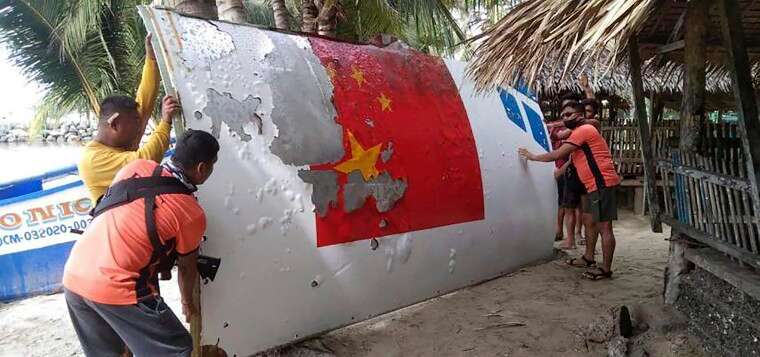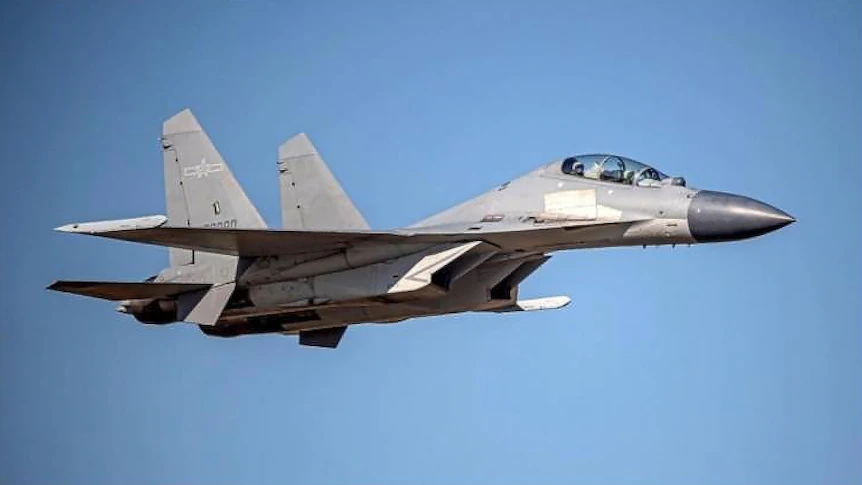
An altercation in the disputed South China Sea resulted in the Chinese coast guard forcibly seizing floating debris that the Philippine navy was bringing to its island, according to a Philippine military officer on Monday. It looked that the debris was from a Chinese rocket launch.
Vice Admiral Alberto Carlos said on Monday that the Chinese ship twice stopped a Philippine military vessel before grabbing the debris it was dragging Sunday off Philippine-occupied Thitu Island. He claimed that nobody was hurt in the incident.
The long-running territorial disputes in the crucial waterway—involving China, the Philippines, Vietnam, Malaysia, Brunei, and Taiwan—have recently flared up again.
In the past, Chinese coast guard ships had stopped Philippine supply boats from bringing supplies to Filipino forces in the disputed waters, but stealing items from another country’s military was more egregious.
Using a long-range camera on Thitu island, Carlos claimed the Filipino sailors discovered the debris 800 yards away, drifting in choppy waves close to a sandbar. They launched a boat, located the floating object, and began towing it toward their island with a rope fastened to the vessel.
“They detected that China coast guard vessel with bow number 5203 was nearing their area and subsequently blocked their pre-plotted course twice,” Carlos said in a statement about the Filipino sailors as they were returning to their island.
When the Filipino sailors’ rubber boat’s towing rope was severed, the Chinese coast guard vessel sent out an inflatable boat with personnel to “forcefully collect the floating object.” Carlos stated without going into detail as to why the Filipino seafarers made the decision to return to their home island.
The military’s Western Command spokesperson, Maj. Cherryl Tindog said the floating metal object resembled several other pieces of Chinese rocket debris that had recently been discovered in Philippine waters. The Filipino seamen, she continued, did not resist the seizure.
In such circumstances, “we exercise the greatest tolerance,” Tindog told reporters. Our crew just decided to go back because it concerned an unexplained object and wasn’t a life-or-death situation.
At least three other times, metal fragments from Chinese rocket launches have been discovered in Philippine waters, some of which have pieces of what appear to be a Chinese flag on them.
China’s crewed space station has recently received supplies and building supplies via rockets launched from the Wenchang Space Launch Center on the island of Hainan.
China has previously come under fire for allowing rocket stages to fall uncontrolled to Earth. After pieces of a Chinese rocket crashed into the Indian Ocean last year, NASA accused Beijing of “failing to meet responsible standards regarding their space debris” and the Philippine Space Agency pushed for the Philippines to ratify U.N. treaties providing a basis for compensation for harm from other countries’ space debris earlier this month.
In response to China’s aggressive actions in the South China Sea, the Philippine government has lodged numerous diplomatic protests; however, it did not immediately state what action it would take in the wake of Sunday’s incident. Normally, the Department of Foreign Affairs in Manila would hold off on filing a protest until the results of an official investigation were released.
In close proximity to Subi, one of seven disputed reefs in the area offshore that China has turned into missile-protected islands, including three with runways, which according to U.S. security officials now resemble military forward bases, Thitu island, which the Filipinos refer to as Pag-asa, is home to a fishing community and Filipino forces.
With the support of the United States and other Western governments, the Philippines and other smaller claimant nations in the disputed area have fiercely objected to and expressed concern about China’s growing assertive operations in the busy waterway.
In order to reaffirm the United States’ commitment to defending its longtime treaty ally in the event that Filipino forces, ships, or aircraft are attacked in the disputed waters, U.S. Vice President Kamala Harris, who is currently in Manila, is scheduled to fly to the western province of Palawan on Tuesday. Palawan borders the South China Sea.





